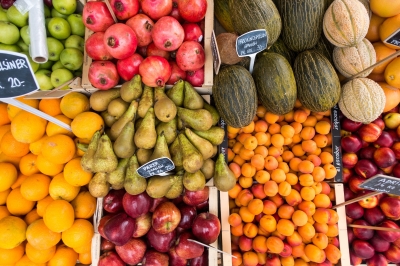How can I stay healthy on a vegan diet?

It doesn't come as a surprise that 63.5% of Brits bought vegan food items in 2021, with the number increasing even more last year. Veganism has become less of a trend and increasingly mainstream thanks to it's health benefits.
However, the diet does lead to you potentially missing out on vital food groups. In preparation for Veganuary, we want to make sure your vegan diet is as nourishing as possible. Here is our advice for staying healthy, balanced and vegan.
A recent study showed that 79 million people across the globe are vegan, that’s almost 10% of the entire population! There are lots of reasons why people choose veganism including their dedication to bettering animal welfare and helping the planet or simply to follow a better diet.
We are not denying that following a largely plant-based diet can work wonders for your body but neglecting vitamin-rich foods can sometimes mean veganism isn’t as nutritional as you first thought. That’s why it’s so important to know which vegan foods help our bodies to function in the same way that meat, fish and dairy products do.
What could I be missing out on?
Vitamin B12
Thanks to all of the fruits and vegetables that are part and parcel of a plant-based diet, vegans can rest assured knowing that they are stocked up on fibre and folate. These two are key for red blood cell generation and nerve function.
However, our bodies need vitamin B12 to help folate do its job properly. This vitamin is found naturally in fish, meat, eggs and poultry, leaving vegan people at a loose end. Luckily, fortified cereals and soya products come to the rescue here. With a hearty bowl of bran, you can up your B12 levels in no time. If you do choose to substitute this way, try to steer clear of added sugars!
Omega-3s
Key to our heart and brain health, Omega-3s are vital to our development and daily functions. Old rule books say that the best way to boost these fatty acids is to eat salmon, sardines, mackerel and cod. Although fish does contain two of the important omega chains, DHA and EPA, people eating a varied vegan diet should have no trouble boosting their Omega-3s.
Nuts and seeds are your saviours when it comes to fulfilling your body’s need for fatty acids. Foods like walnuts, flaxseed and hemp are great sources of ALA omega chains - their oils are also great too! If you want to test your tastebuds, sea vegetables like seaweed and nori are two of a very small number of plant groups that contain DHA and EPA. It might be useful to supplement with a micro-algae supplement if you’re finding boosting your Omega-3s challenging.
Iron
For years there has been a misconception that vegans are at higher risk of iron deficiency due to their diet. However, we are here to bust the myth and tell you that this is not true as long as - again - you are following a diverse diet.
Iron is found in ingredients such as lentils, chickpeas and beans and its absorption is helped along by Vitamin C, something that vegans consume loads of! Sometimes it’s hard to find inspiration for how to pack your meals full of iron but if you start with simple bases like lentil curries and porridge, you can spice things up with flavours and toppings.
Quick tip! Tea can make it difficult for your body to absorb iron so stay away from a brew at mealtime.
On top of all of this, you should also follow a nutritionist’s holy grail and always eat breakfast. This is particularly important for people who follow a plant-based diet as their energy levels are more prone to dropping throughout the day. Eating little and often can help with this too.
With all of this actionable advice, we hope you make this year’s Vengauary as varied, balanced and diverse as ever before!
Information contained in this Articles page has been written by talkhealth based on available medical evidence. The content however should never be considered a substitute for medical advice. You should always seek medical advice before changing your treatment routine. talkhealth does not endorse any specific products, brands or treatments.
Information written by the talkhealth team
Last revised: 4 January 2023
Next review: 4 January 2026
